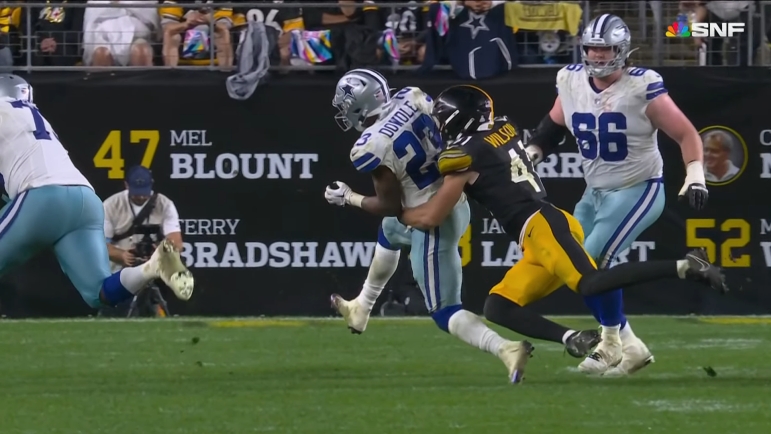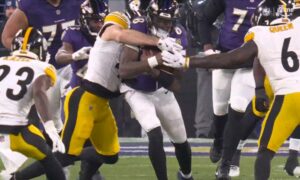Player: ILB Payton Wilson
Stock Value: Up
Reasoning: While he isn’t playing any kind of elite football yet, rookie Payton Wilson continues to progress. The past two weeks have seen his snap count rise, which is directly reflective of that. Elandon Roberts reminded us that he very much retains a place in this defense, but Wilson’s snap count isn’t accidental.
I still don’t know what Payton Wilson’s long-term future is, or how close he may be to his ceiling. In theory, he should have a very high ceiling because he has great intelligence and athleticism. He isn’t the biggest, most physical linebacker, but he can figure out ways to work around that.
His best game so far might have been the week before last, but Wilson showed us his defining trait on Sunday: finding the ball. He recorded a career-high nine tackles against the Cowboys, though he’s still looking for his first TFL.
I should add that only two of Payton Wilson’s tackles actually resulted in successful defensive plays. Right now, he is largely cleaning up the mess. As he plays more, though, he will play more instinctually and aggressively. We should see him making more tackles closer to the line of scrimmage once he locks in better above the neck, which is always a process for a rookie, no matter how intelligent. And that is going to be the case even more so for an intellectually demanding position like inside linebacker.
But as I said at the top, while Wilson logged 44 snaps against the Cowboys, Elandon Roberts in his 21 snaps reminded us why he is still here and still on the field. His goal-line play that caused a fumble in the clutch nearly saved the game, but the Steelers couldn’t recover. And that is typical of his play. I don’t know that Wilson can play with that physicality at his current weight.
As the season progresses, Steelers players’ stocks rise and fall. The nature of the evaluation differs with the time of year, with in-season considerations being more often short-term. Considerations in the offseason often have broader implications, particularly when players lose their jobs, or the team signs someone. This time of year is full of transactions, whether minor or major.
A bad game, a new contract, an injury, a promotion—any number of things affect a player’s value. Think of it as a stock on the market, based on speculation. You’ll feel better about a player after a good game, or worse after a bad one. Some stock updates are minor, while others are likely to be quite drastic, so bear in mind the degree. I’ll do my best to explain the nature of that in the reasoning section of each column.








